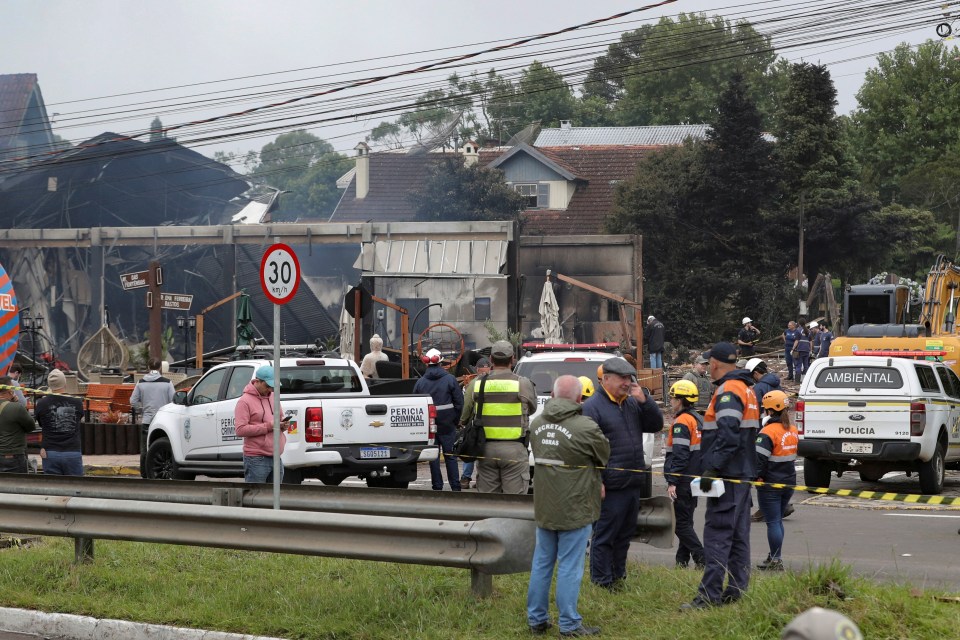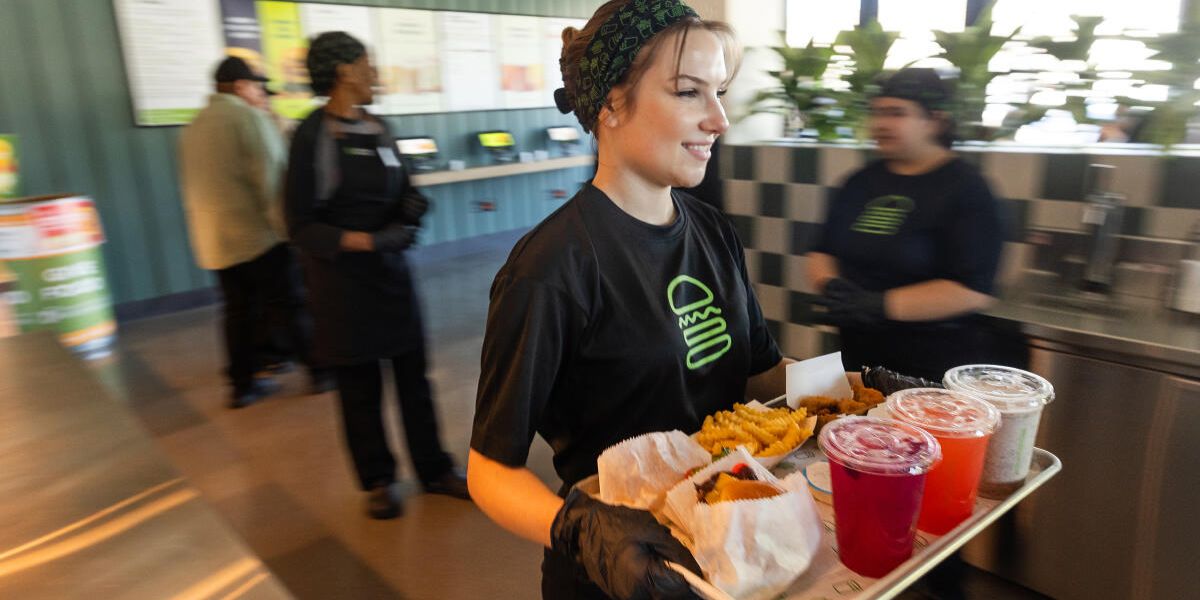As Fast-food Wages Soar to $20, Other Workers Ask, ‘What About Our Salary Checks?
Stephon Harris earns $16.35 per hour at Rancho San Miguel Market, rounding up clients for pints of fresh salsa and masa. A few hundred feet away, at a Jack in the Box drive-through, workers are earning approximately $4 more per hour because to California’s required $20 minimum wage for fast-food employees, which went into effect last month.
“I would like to make that,” Harris, 21, said as he assisted customers.
He is one of California’s low-wage workers who has been excluded from sector-specific minimum pay recently adopted by the Legislature, while hospital personnel — including gift shop cashiers and cleaners — are scheduled to earn at least $25 per hour under another similarly hard-fought arrangement at the state Capitol.
Harris, who lives with his parents and claims the grocery store employment is temporary, is not upset. He simply wants in, too.
“In fast food, you must deal with a lot. “People are more rude to you,” he explained. “But everyone wants to produce more. Sixteen bucks per hour is absolutely not enough to maintain a family.” The fast-food and healthcare wage standards join a distinct patchwork of rules imposed by some California towns, which oblige firms to pay more than the state’s $16 hourly minimum.
Now, workers like Harris, who are still earning the minimum wage, are asking: What about us? “Clearly the Legislature understands that some workers deserve $20, so they must understand that everybody deserves $20,” said Saru Jayaraman, president of One Fair Wage, a nationwide organization advocating for increased service sector wages.
Jayaraman, who also directs the Food Labor Research Center at UC Berkeley, led a rally outside the Capitol in Sacramento last week, pushing for a statewide minimum wage of $20 for all. She recognized that the proposal is a “heavy lift” even in liberal, pro-union California, with business owners saying that they cannot afford the additional costs and the state facing a budget shortfall estimated by the governor’s office to be more than $37 billion.
Some restaurant and retail workers, school staff, and child-care providers earn the lowest earnings in California. They are now enticed to abandon occupations for fast food or healthcare, potentially exacerbating staffing shortages that have never recovered from the epidemic, Jayaraman explained.
“There is no way around raising pay at this time. People are simply saying, ‘I cannot afford to do this anymore,'” she remarked outside the Capitol. “If you see every other price go up and the wages have not, you’re going to end up with massive staffing crises in every low-wage sector.” The national campaign’s demand outstrips a statewide ballot item that Californians will vote on in November — a $18-per-hour proposition that was once considered radical but is now eclipsed by the most recent industry regulations.
California has one of the highest minimum wages in the country, and it automatically raises with inflation, significantly above the $7.25 federal minimum wage. However, it also has some of the world’s most costly cities. According to recent federal data, the minimum wage equals roughly $33,000 per year, whereas the average cost of living in California is around $53,082.
While labor unions had unprecedented success enacting pro-worker policies following widespread strikes last year, the Legislature has not authorized a statewide minimum wage increase for all workers since 2016, when it was $10 per hour. And there is no public push from Gov. Gavin Newsom or a coordinated campaign by state Democrats to do so.
Liz Ortega, a Democrat from Hayward, chairs the Assembly Committee on Labor and Employment. When asked if the Legislature intended to impose a higher minimum wage for all, she replied, “I wish it was that easy.”
Instead, Democrats have been “chipping away at it,” said Ortega, a long-time labor leader. Excluded workers’ demands are expected, she noted and can benefit the cause. “I think this is a terrific conversation to have. “That means we’re making progress,” she explained. “I favor pay increases, period. “I don’t have a number in mind.”
Joe Sanberg, a wealthy Los Angeles investor and anti-poverty campaigner, is behind the approaching $18-per-hour minimum wage ballot initiative, and he is trying to persuade voters that it is a major rise despite the fact that other categorical mandates have surpassed it.
Political strategy among Sacramento insiders is getting in the way, he said, because unions disagree on the appropriate method and if $18 is enough to fight for right now. Just last week, San Diego unions representing hotel, cleaning, and convention workers demanded $25 per hour. The Fight for $15 campaign, which was deemed revolutionary over a decade ago, changed its name to Fight for a Union last week, reflecting how the movement has evolved.
But Sanberg persists, pointing out that if it passes, millions of Californians will see an increase in income. Higher wage efforts can still follow, he added. “Should we spend more than $18? Yes, of course,” Sanberg replied. “This idea to pull it back in order to go for something bigger in the future … that point of view is kind of making chess pieces out of working people’s lives.”
While some data indicates that higher salaries benefit the economy and do not harm small businesses, some fast-food outlets have moved to lay off employees and raise prices in response to wage regulations. Newsom and lawmakers are also finding out how to cover the costs of the healthcare wage rise, which state officials estimate will cost $4 billion in the first year of implementation.
Republicans and business groups, such as the California Chamber of Commerce, have long opposed minimum wage increases, claiming that business owners should be able to make their own financial decisions and that the state already does more for workers than most.
“We can’t expect the business community to absorb this repeatedly,” said Assemblymember Heath Flora (R-Ripon), co-chair of the labor committee.
Flora said he’s heard from residents who are “resentful” of the latest salary hikes and believe they were excluded because they “don’t have a powerful labor group or lobbyist” to support them.
The minimum wage in Los Angeles will rise by 50 cents in July to $17.28 per hour.
Tricia La Belle, who owns pubs and restaurants in Los Angeles, recently placed two businesses for sale as she struggles to keep up with expenses. She claims that any new salary increases will hurt small-business owners like her.
“I can’t do it anymore. “We’re in the red,” said La Belle, who is also president of the Greater Los Angeles Hospitality Association. “No eateries can withstand this. Between insurance, utilities, rent, and labor costs, we’ll see eateries fall like dominoes this year.”
Assemblymember Ash Kalra (D-San Jose) is pushing a bill through the Legislature that would mandate California to perform a study on raising the minimum wage, calling the present rate “wholly inadequate.” The so-called study bill also asks the state to investigate raising salaries for jailed workers, some of whom earn $2 per hour and work as firefighters.
Kalra described it as a “challenging” and “major effort” to get all affected parties on the same page about where to go next with the minimum wage. But he said it was time. “Sometimes it’s easier when you focus in on a particular industry; however, in order to create some sense of equity, I think it’s good to create one higher minimum wage that makes sense,” Kalra stated.
Some California communities have gone ahead on their own: officials in West Hollywood upped the minimum wage to $19.08, while firms in Mountain View, San Francisco, and Berkeley must pay more than $18 per hour.
In a report released last month, the independent Legislative Analyst’s Office advised that the California Legislature explore establishing regional minimum salaries rather than leaving it up to local governments, citing the state’s significantly varying costs of living. Housing in California’s major metro areas is “unaffordable even for workers with wages well above the minimum wage,” according to the report.
“In the most fundamental sense, the statewide minimum wage is far greater than the ‘poverty wage.’ At the same time, the state’s high housing prices make it difficult for many low-wage workers to make ends meet, according to the report.










